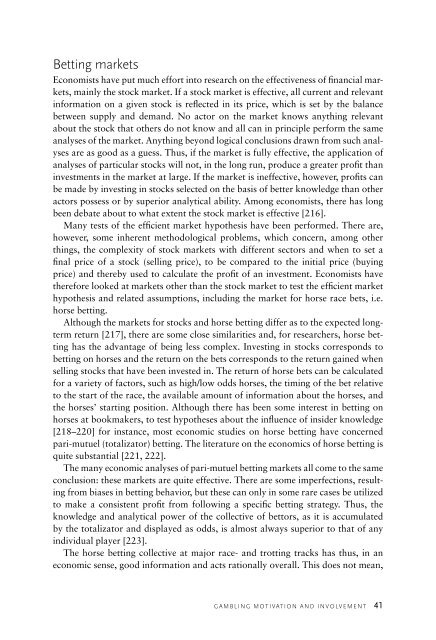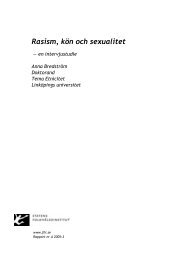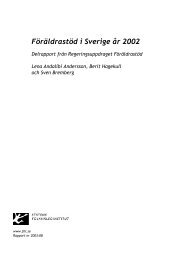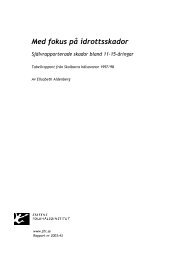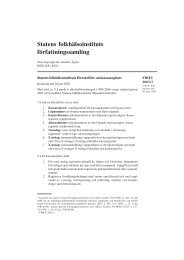Gambling motivation and involvement: A review of social
Gambling motivation and involvement: A review of social
Gambling motivation and involvement: A review of social
You also want an ePaper? Increase the reach of your titles
YUMPU automatically turns print PDFs into web optimized ePapers that Google loves.
Betting markets<br />
Economists have put much effort into research on the effectiveness <strong>of</strong> financial markets,<br />
mainly the stock market. If a stock market is effective, all current <strong>and</strong> relevant<br />
information on a given stock is reflected in its price, which is set by the balance<br />
between supply <strong>and</strong> dem<strong>and</strong>. No actor on the market knows anything relevant<br />
about the stock that others do not know <strong>and</strong> all can in principle perform the same<br />
analyses <strong>of</strong> the market. Anything beyond logical conclusions drawn from such analyses<br />
are as good as a guess. Thus, if the market is fully effective, the application <strong>of</strong><br />
analyses <strong>of</strong> particular stocks will not, in the long run, produce a greater pr<strong>of</strong>it than<br />
investments in the market at large. If the market is ineffective, however, pr<strong>of</strong>its can<br />
be made by investing in stocks selected on the basis <strong>of</strong> better knowledge than other<br />
actors possess or by superior analytical ability. Among economists, there has long<br />
been debate about to what extent the stock market is effective [216].<br />
Many tests <strong>of</strong> the efficient market hypothesis have been performed. There are,<br />
however, some inherent methodological problems, which concern, among other<br />
things, the complexity <strong>of</strong> stock markets with different sectors <strong>and</strong> when to set a<br />
final price <strong>of</strong> a stock (selling price), to be compared to the initial price (buying<br />
price) <strong>and</strong> thereby used to calculate the pr<strong>of</strong>it <strong>of</strong> an investment. Economists have<br />
therefore looked at markets other than the stock market to test the efficient market<br />
hypothesis <strong>and</strong> related assumptions, including the market for horse race bets, i.e.<br />
horse betting.<br />
Although the markets for stocks <strong>and</strong> horse betting differ as to the expected longterm<br />
return [217], there are some close similarities <strong>and</strong>, for researchers, horse betting<br />
has the advantage <strong>of</strong> being less complex. Investing in stocks corresponds to<br />
betting on horses <strong>and</strong> the return on the bets corresponds to the return gained when<br />
selling stocks that have been invested in. The return <strong>of</strong> horse bets can be calculated<br />
for a variety <strong>of</strong> factors, such as high/low odds horses, the timing <strong>of</strong> the bet relative<br />
to the start <strong>of</strong> the race, the available amount <strong>of</strong> information about the horses, <strong>and</strong><br />
the horses’ starting position. Although there has been some interest in betting on<br />
horses at bookmakers, to test hypotheses about the influence <strong>of</strong> insider knowledge<br />
[218–220] for instance, most economic studies on horse betting have concerned<br />
pari-mutuel (totalizator) betting. The literature on the economics <strong>of</strong> horse betting is<br />
quite substantial [221, 222].<br />
The many economic analyses <strong>of</strong> pari-mutuel betting markets all come to the same<br />
conclusion: these markets are quite effective. There are some imperfections, resulting<br />
from biases in betting behavior, but these can only in some rare cases be utilized<br />
to make a consistent pr<strong>of</strong>it from following a specific betting strategy. Thus, the<br />
knowledge <strong>and</strong> analytical power <strong>of</strong> the collective <strong>of</strong> bettors, as it is accumulated<br />
by the totalizator <strong>and</strong> displayed as odds, is almost always superior to that <strong>of</strong> any<br />
individual player [223].<br />
The horse betting collective at major race- <strong>and</strong> trotting tracks has thus, in an<br />
economic sense, good information <strong>and</strong> acts rationally overall. This does not mean,<br />
G A M B L I N G M O T I VAT I O N A N D I N V O LV E M E N T 41


